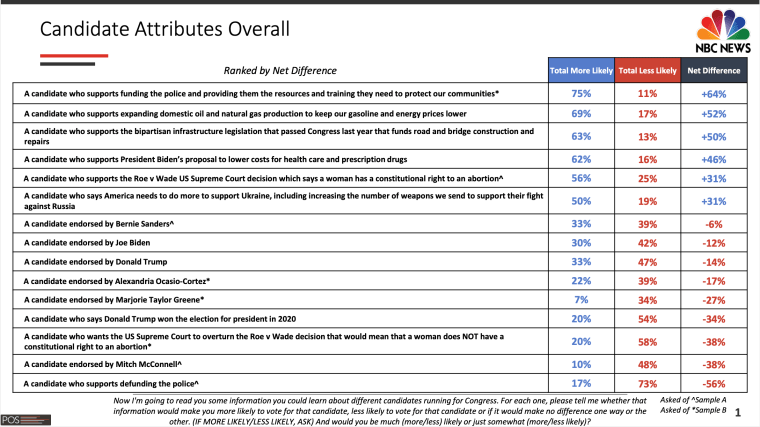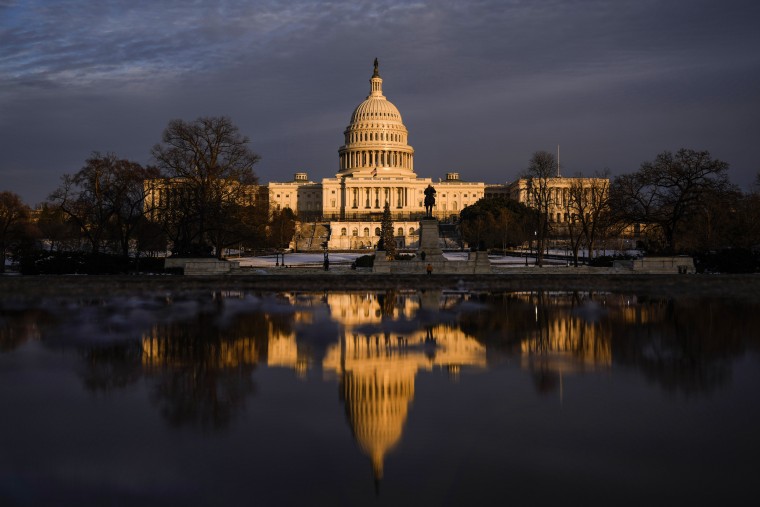WASHINGTON — If it’s Wednesday .... Russia redeploys troops from Kyiv. ... President Biden delivers remarks on Covid as the CDC signs off on second booster for those 50 and older. ... NRCC says it’s targeting 72 House districts for midterms. ... Five states have yet to finalize their new congressional maps. ... And Trump asks Russia for help — again.
But first: The latest release from our new NBC News poll measured 15 different candidate issues or qualities as we look ahead to November’s midterm elections.
The most popular issues and qualities among registered voters: funding the police, expanding oil and gas production, supporting the bipartisan infrastructure law and supporting Biden’s call to lower health care and prescription-drug costs.
The least popular: saying Trump won the 2020 presidential election, wanting to overturn Roe v. Wade, being endorsed by Senate Minority Leader Mitch McConnell and defunding the police. (The number in parentheses is the difference between those more and less likely to vote.) More findings:
- A candidate who supports funding the police: 75 percent more likely to vote, 11 percent less likely (+64).
- A candidate who supports expanding oil and gas: 69 percent more likely, 17 percent less likely (+52).
- A candidate who supports bipartisan infrastructure law: 63 percent more likely, 13 percent less likely (+50).
- A candidate who supports lowering health/drug costs: 62 percent more likely, 16 percent less likely (+46).
- A candidate who supports Roe v. Wade decision: 56 percent more likely, 25 percent less likely (+31).
- A candidate who wants to do more to support Ukraine: 50 percent more likely, 19 percent less likely (+31).
- A candidate endorsed by Bernie Sanders: 33 percent more likely, 39 percent less likely (-6).
- A candidate endorsed by Joe Biden: 30 percent more likely, 42 percent less likely (-12).
- A candidate endorsed by Donald Trump: 33 percent more likely, 47 percent less likely (-14).
- A candidate endorsed by Alexandria Ocasio-Cortez: 22 percent more likely, 39 percent less likely (-17).
- A candidate endorsed by Marjorie Taylor Greene 7 percent more likely, 34 percent less likely (-27).
- A candidate who says Trump won in 2020: 20 percent more likely, 54 percent less likely (-34).
- A candidate who wants to overturn Roe v. Wade: 20 percent more likely, 58 percent less likely (-38).
- A candidate endorsed by Mitch McConnell: 10 percent more likely, 48 percent less likely (-38).
- A candidate who supports defunding the police: 17 percent more likely, 73 percent less likely (-56).

The poll also shows some fascinating intraparty divides.
While most Democratic voters who backed Biden in the primaries are more likely to vote for a candidate who supports funding the police (by 79 percent to 4 percent), a plurality of Bernie Sanders and Elizabeth Warren primary voters are less likely to vote for such a candidate.
Biden primary voters are more likely to support a candidate who wants to expand oil and gas production (by 59 percent to 23 percent), while Sanders/Warren voters are less likely to vote for that candidate.
And interestingly, Sanders/Warren voters are more supportive of a candidate who wants to do more to support Ukraine (by 65 percent to 11 percent) than Biden primary voters are (49 percent to 22 percent). FYI: This is mainly due to African-American voters in the poll being less supportive of candidates wanting to do more to help Ukraine.
Inside the GOP, meanwhile, Trump-first Republicans are split on supporting a candidate who backs the bipartisan infrastructure bill (38 percent more likely to vote, 37 percent less likely), and party-first Republicans are more supportive (42 percent more likely, 20 percent less likely).
And Trump-first Republicans mostly oppose candidates endorsed by McConnell (16 percent more likely to vote, 49 percent less likely), while party-first Republicans are more open to them (24 percent more likely to vote, 10 percent less likely).
The NBC News poll was conducted March 18-22 of 790 registered voters, and the overall margin of error here is plus-minus 3.49 percentage points.
Tweet of the day
Data Download: The number of the day is … 72
That’s how many seats the National Republican Congressional Committee is targeting in November, ahead of a midterm that many expect to be fought on favorable ground for Republicans. Republicans need a net gain of just five seats to take control of the House.
The new announcement from the NRCC is a rejiggering of their target list now that redistricting is almost finished. Nearly half of the target list — 33 districts — are seats that President Biden won by at least 10 percentage points. The decision to target Democratic territory underscores Biden’s sinking approval ratings even among his party’s base, as well as the reality that redistricting has resulted in fewer competitive districts.
Other numbers you need to know today:
$102 million: That’s how much the Democratic super PAC House Majority PAC is spending on its initial wave of TV ad buys, reserving airtime across 50 media markets, per the New York Times.
21: The number of states suing the CDC and other federal agencies calling on them to end the public transportation mask mandate.
4 million: The number of people who have fled Ukraine, the United Nations announced Wednesday.
17 percent: The portion of Americans surveyed in the latest Gallup poll who listed inflation as the most important problem facing the country, up from 10 percent who said the same in February.
80,222,859: The number of confirmed cases of coronavirus in the United States, per the most recent data from NBC News and health officials.
983,498: The number of deaths in the United States from the virus so far.
Midterm roundup: Map flaps
Five states have yet to finalize their congressional maps, per 538, including Florida, Louisiana, Maryland, Missouri and New Hampshire. And things just got more complicated in Florida where Republican Gov. Ron DeSantis vetoed the congressional map passed by the GOP-controlled legislature, extending the intraparty feud.
Even in states where maps were finalized, court battles continue to cast uncertainty over the new district boundaries. Ohio’s Redistricting Commission has struggled to get a map past the courts, and the Ohio Supreme Court put out a new schedule that said it won’t review the latest map until after the state’s May 3 primary, per The Columbus Dispatch.
Elsewhere on the campaign trail:
Ohio Governor: On the GOP side, incumbent Gov. Mike DeWine is up with his first TV spot touting the state’s school re-opening and his budget proposal adding funding for law enforcement amid some progressive pushes to cut funding. The Democrats vying to take on DeWine faced off on the debate stage Tuesday night, where the governor was the main focus, per the Cincinnati Enquirer.
Ohio Senate: Rep. Tim Ryan, the frontrunner in the Ohio Democratic primary, is out with a new ad focused on one topic — China.
Pennsylvania Senate: Two of the frontrunners in the GOP primary, celebrity doctor Mehmet Oz and former hedge fund manager Dave McCormick, will share a stage at a forum on Wednesday morning, per the Philadelphia Inquirer’s Jonathan Tamari.
Connecticut Governor: Democratic Gov. Ned Lamont is up with his TV first ad touting his economic record.
Virginia 02: Democratic Rep. Elaine Luria is out with a new statement blasting the Biden Administration’s defense budget, arguing “it sucks.”
Ad watch: Gibbons attacked again
Mike Gibbons, an investment banker and candidate for the Ohio Republican nomination for Senate, is under fire again for comments he made at a candidate forum earlier this month. In an altercation between Gibbons and former Ohio treasurer Josh Mandel, Gibbons accused Mandel of having no experience in the private sector. Mandel defended himself, citing his time in the U.S. Marines.
Now, the outside group USA Freedom Fund, which is backing Mandel, is out with a TV ad alleging Gibbons is “unfit to serve.” The ad features former Marine Sgt. Brian Sizer, who tells viewers, “Mike Gibbons should be ashamed of himself. He owes Josh Mandel and everyone else that served the United States military a direct apology.”
This ad is out just one day after Mandel himself released an ad addressing the spat. Gibbons has defended himself against these attacks, citing his son’s service in the military and calling Mandel a liar.
ICYMI: What else is happening in the world
Biden signed a bill into law that makes lynching a federal hate crime.
The AP explores NRSC Chairman Rick Scott’s clashes with GOP leadership over his policy platform.
Congressional Republicans are fuming after Rep. Madison Cawthorn, R-N.C., claimed some lawmakers have invited him to sex parties and have used cocaine in front of him without offering any specifics.





